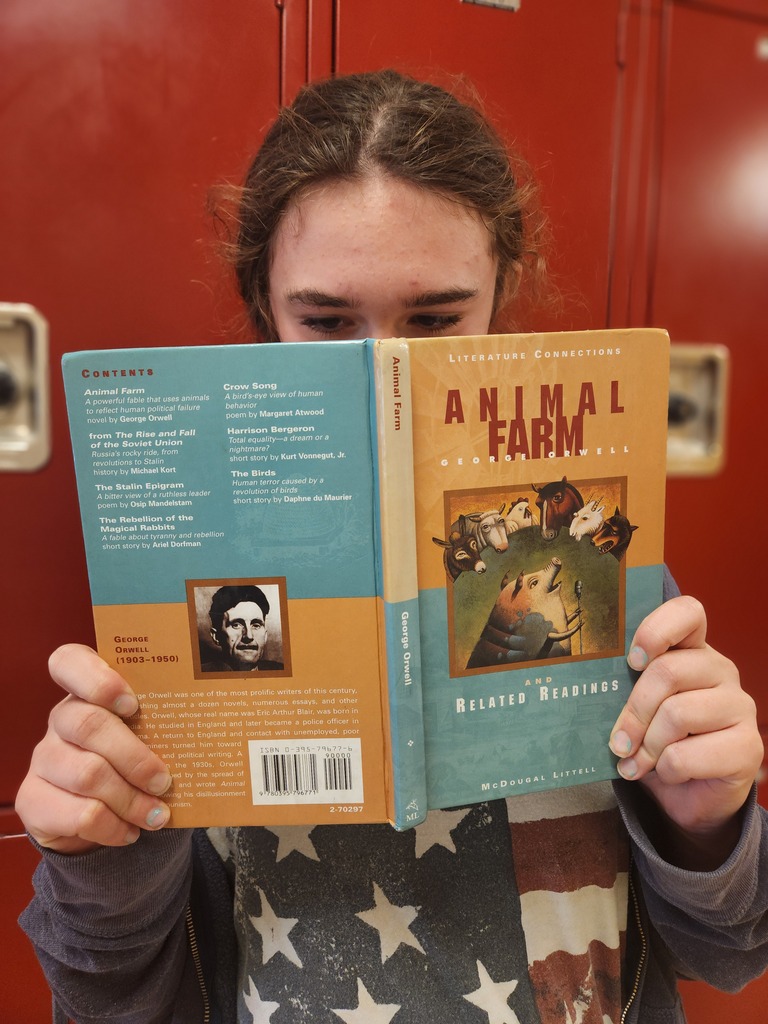Animal Farm Review: To Read OR Not to Read?
Animal Farm Review: To Read OR Not to Read?
By Alayna Dallman
The novel Animal Farm by George Orwell, published in 1945, is arguably one of the most debated books of all time; to read or to not read? Although it may be understood as a violent book and/or its political satire that is a representation of the Russian Revolution of 1917, I found it to be very page-turning. I feel that the book itself has a unique writing style that seems to unfold the book in a fairy-tale-like structure. It kept me entertained and the chapters were decently lengthened.
The story takes place at a farm called Manor Farm, owned by the nefarious Mr. Jones. In the book, an elderly pig called Old Major holds a meeting with the farm’s animals at night —which consists of dogs, pigs, horses, etc.– and warns the animals of the dangers of man. This was a spark of the rebellion against the humans, and the start of a practice the animals created, called Animalism, which eventually leads the animals into a dictatorship. The animals soon are put to work by the pigs, creating their own set of “commandments” that are eventually broken. The book therefore starts to unfold in a series of events that are unfortunate, bittersweet, and disturbing.
It started out small. The animals were set to work (and they obliged happily), yet slowly, the pigs started to break their own “Seven Commandments of Animalism”. As they were opposed once to drinking and sleeping in beds, the pigs suddenly now became more “human-like”, twisting their own laws to suit their own humanly pleasures.
Every character represents somebody from the Russian Revolution; the pigs represent Bolshevik leadership, Napoleon is representing Joseph Statlin, Mr. Jones is Czar Nicholas II, Snowball (another pig) is Leon Trotsky, Squealer is Vyacheslav Molotov, and the animals represent the classes of Russia. Much like the Russian Revolution, Animal Farm starts out with the idea of equality and justice for the animals, but then ends up failing miserably when the pigs take power.
Overall, I rate the book a solid 8 out of 10. The book was very entertaining and insightful, yet sometimes the book’s dialogue seemed to drag on and on. (Keep in mind this book was made in the 1940’s.) There is some violence in it such as murder, and battles between the humans and animals, but it isn’t too gory. . If violence, abuse, and death is something that triggers you, I wouldn’t recommend reading this book.
So, in conclusion, if you are into animal fiction or political satire, I would definitely recommend this book for you, so long as you can handle the elements in the story. Keep in mind that violence and death are apparent in this novel, as well as tyranny towards the animals, who are forced to labor for the pigs. (Which, at first, they did happily, but then stopped being cheerful in their labor.)
Also, if you enjoyed this book, you may be interested in the live-action Animal Farm movie (1999) and the cartoon movie (1954).
Books are always better!!!!

Photo Cred: Lauren Dysert


